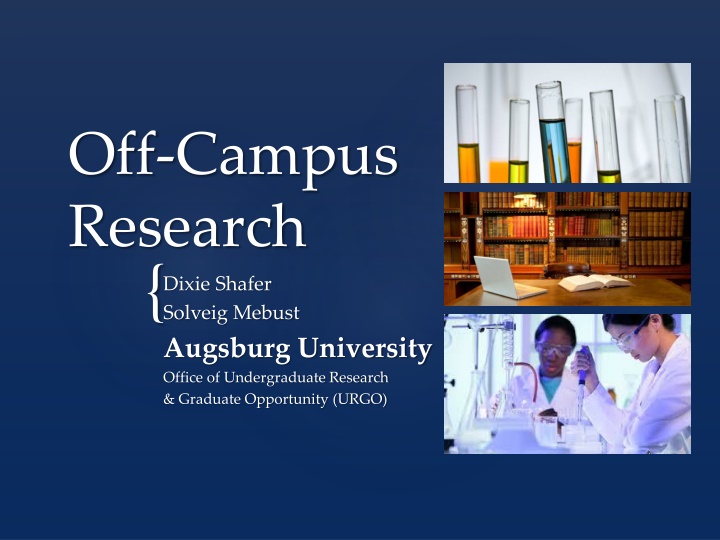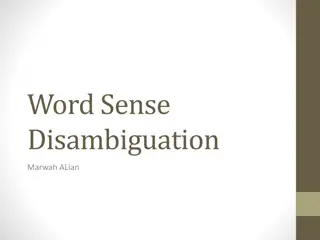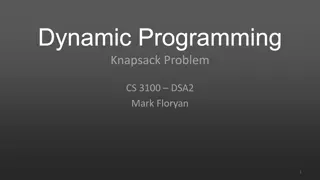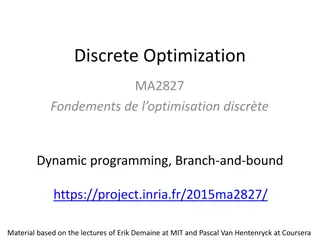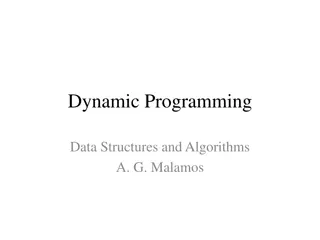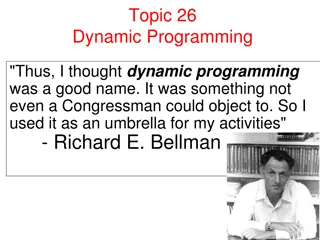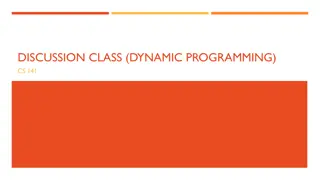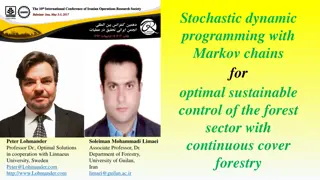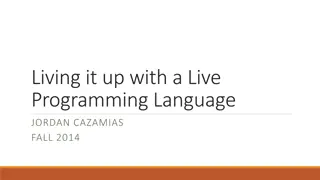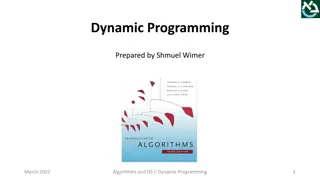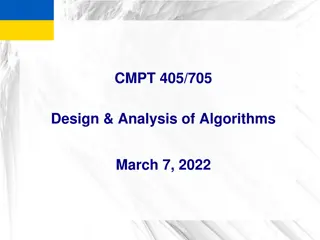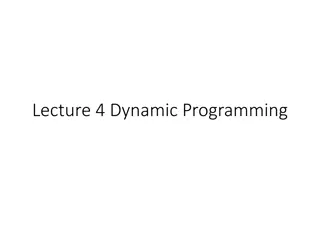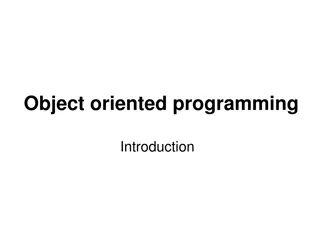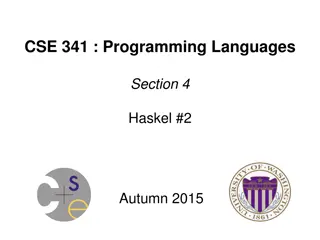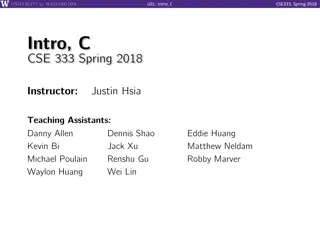Dynamic Programming Approaches and Solutions
In this comprehensive guide by Alexandra Stefan, learn about various approaches for solving dynamic programming problems, including greedy, brute force, iterative, memoized, recursive, and sliding window techniques. Understand the concepts of optimal substructure and overlapping subproblems in dynamic programming and the differences between bottom-up and top-down approaches. Explore tips and insights essential for tackling algorithms and data structures effectively.
Uploaded on Apr 04, 2025 | 0 Views
Download Presentation

Please find below an Image/Link to download the presentation.
The content on the website is provided AS IS for your information and personal use only. It may not be sold, licensed, or shared on other websites without obtaining consent from the author.If you encounter any issues during the download, it is possible that the publisher has removed the file from their server.
You are allowed to download the files provided on this website for personal or commercial use, subject to the condition that they are used lawfully. All files are the property of their respective owners.
The content on the website is provided AS IS for your information and personal use only. It may not be sold, licensed, or shared on other websites without obtaining consent from the author.
E N D
Presentation Transcript
Off-Campus Research { Dixie Shafer Solveig Mebust Augsburg University Office of Undergraduate Research & Graduate Opportunity (URGO)
Introductions { Name, School, Major/Interest area
Competitive programs at research universities for undergrads The research university environment 8-12 weeks of full-time research under a research mentor Often a cohort model that can include professional development seminars, guest speakers, courses, cultural outings, GRE prep Different programs: goals, targeted students, requirements Paid (+ housing and travel usually) What is off-campus research?
Why do research? Why do research off-campus?
{ { Why off-campus? Why do research? Explore topics in- depth and discover what interests you in your field Explore new sub- fields and specialty areas See what research at an R1 looks like Get to know a department s culture: faculty, grad students , work culture Possibilities of publishing Extend your network External letter of rec Explore a new city! Enhance your writing, speaking, and critical-thinking abilities Become a more competitive applicant Why do research off-campus?
Faculty Current and past students URGO s website REUs { Apply to 5-10 Other colleges databases Your field s professional org How to find opportunities
Course completion requirements Academic standing (first-year, sophomore, etc.) Citizenship GPA Major Underrepresented as defined by the program Read carefully: sometimes programs are only accepting students from a region or particular schools Read preferences: programs might be looking for students from community colleges, underrepresented populations, those with no research experience, interested in PhD or health sciences Eligibility
{ { Community College Fit Minnesota Programs Computational Methods and Big Data Parkland - Biology Montana State Computer Engineering Chemistry Lando SUMMIT Lillehei Heart Institute LSSURP Kansas State - Chem Mayo Biomedical Ethics URGO website for more Highlighted Programs
{ {
Application Components Transcripts CV/Resume get reviewed!!! Low grades might need explanation Personal statement or short answer questions Online application with biographical info Deadlines 2 recommendation letters from faculty in your major or related fields Most due January March Winter break: list of programs, resume, drafting answers Get feedback on multiple drafts
Please explain why you would like to participate in the program. Your answer should be approximately 400-1000 words. You may want to incorporate your reasons for seeking this type of experience, the appropriateness of your academic preparation for full-time lab research, any previous research, and/or your particular academic and career interests. Sample Prompt Single Essay
What are your career goals? 200 word prompts: What other experience do you have that might be relevant for research? Why would you like to do research at the AMNH this summer? What attracted you to your top choice project? What skills do you hope to acquire during the summer program? Sample Prompts Multiple Responses
To prepare myself for graduate study, I would like an additional research experience. I come from a small college where undergraduate research opportunities in biology are limited. Conducting research at an institution like Boston University provides access to greater technology and learning through seminars as well as dialogue with established researchers. Having access to a larger lab and more advanced equipment would greatly benefit my research skills. Participating in SURF would aid me in becoming the well-rounded and skilled scientist I hope to become, one day supervising a lab at a university or in industry. Tips Fitting funder s mission: Liberal arts and community colleges
I have realized my passion for research during my first year at community college. But, as a low-income, first-generation college student, there were few role models in my life who could guide me in finding the opportunities to gain skills and experiences in scientific research. My department at Minneapolis College is very supportive but does not have funding to provide research opportunities outside of coursework. Because I hope to be that role model for other students who come from similar circumstances, the opportunity at the University of Nebraska Summer Undergraduate Research Program will fill an important role in helping me develop as a researcher. Tips Fitting funder s mission: Underserved students
In my computer science classes I am learning to determine what an algorithm does, as well as how to create algorithms to solve problems, such as sorting lists of data. I am building on my previous experience, expanding my understanding and comprehension of what it means to be a computer scientist. For example my Introduction to Java class comes fairly easy to me not because I have programmed in Java before, but instead because I have used object oriented languages such as Swift and ObjectiveC for IOS devices. Math courses in Calculus I and II, along with Introduction to Statistics have really helped me understand the multitude of different relationships between complex theorems, such as the fundamental theorems of calculus. With a strong background in math I can more easily create simple solutions to complex problems. Tips - Coursework
I completed 400-hour research project under the supervision of Dr. Matthew Beckman. The focus of the lab is working with a single-eyed crustacean, Daphnia magna, to illuminate the genetic origin of this anomaly. I had the task of conducting a side project looking at a closely related crustacean, focusing on its eye development along with hedgehog gene expression. I collaborated often with my lab mates and established a close rapport with my mentor. From this, I gained confidence in my decision making and learned new methods pertaining to molecular biology such as using RT -qPCR comparative Ct method to measure gene expression. I successfully completed my work having developed a protocol for culturing the animals, designing and validating a primer and probe set, as well as giving a written and oral report on my findings. Tips Prior research or extensive class project
I learned that research is an exercise in delayed gratification, much different than the immediate results I experienced while completing lab work for my courses. For example, when validating my primer and probe set for qPCR, it took far longer than I originally thought it would. Another challenge was devising a method to culture animals that the lab previously had no success with. Despite this, I forged on and was able to begin collecting preliminary data. While some days I would be frustrated with the lack of results, even the slightest promise of newfound knowledge kept me returning each day. Tips Reflection on past experiences
Research experience Class projects Leadership experience Work experience Skills: writing, problem-solving, critical thinking, time management, learning from mistakes, working in a team Attributes: detail-oriented, self-motivated, persistent, adaptable, hard-working, curious, reliable Tips- Other relevant items
NIST laboratories are the perfect fit for my interest in cutting- edge research in spectrometry or applied mathematics and simulation. A position at NIST would aid me in making decisions about a graduate research focus and provide me with necessary experience working in a large lab. It would help better identify the type of research environment that is the best match for my interests and abilities and provide direction for my scientific career . A research position at NIST will help expand my research skills, my knowledge, and my experience, all of which I am determined to improve. I would like to improve my communication skills while at NIST through the communication I will have my mentor and other scientists. I want to advance a NIST project this summer with my participation and I want get the most I can out of my time at NIST. Tips -Why this program?
Comparative genomics along with genetics are also fields that greatly interest me. This is why I find the project on Myxozoan Parasites of Amazonian Fishes so compelling. It is clear that these microscopic organisms are a widespread issue for farmed fishes as well as wild populations. Just reading a few articles left me eager to delve into the genetics of their parasitism. I have experience working with small amounts of genetic material to amplify and this is a process I would like to continue and develop. The prospect of working on a largely genetics-based project excites me, in addition to learning how to apply bioinformatics to findings. Because I am considering graduate study in genomics, it is important that I learn how to analyze complex data. I strive to become more interdisciplinary, and this project would give me a new perspective on problem-solving. Tips What research interests you?
Participation in Cornells Microbial Friends and Foes program will contribute another important step in achieving my academic and professional goals. Whether I am looking into disease resistance with Dr. Gary Bergstrom or Dr. Rebecca Nelson or looking into nutrient acquisition and plant-fungi symbiosis with Dr. Maria Harrison, I know that I will learn a great deal about plant pathology no matter who I work with. Following my time at Augsburg I hope to attend graduate school so I can participate in research either in an industry position or in an academic setting. With my graduate degree, I hope to further the knowledge of plant genetics and plant-microbe interactions, as these fields have such great potential in supplying food in the most efficient way for an ever growing global population. Tips Future plans and goals
Acceptance notifications vary by program some notify quickly, some take months. Short time to make a decision Most have waitlists What to do when accepted to more than one opportunity What happens next?
urgo@augsburg.edu Hagfors Center 101 Contact for Augsburg Students
